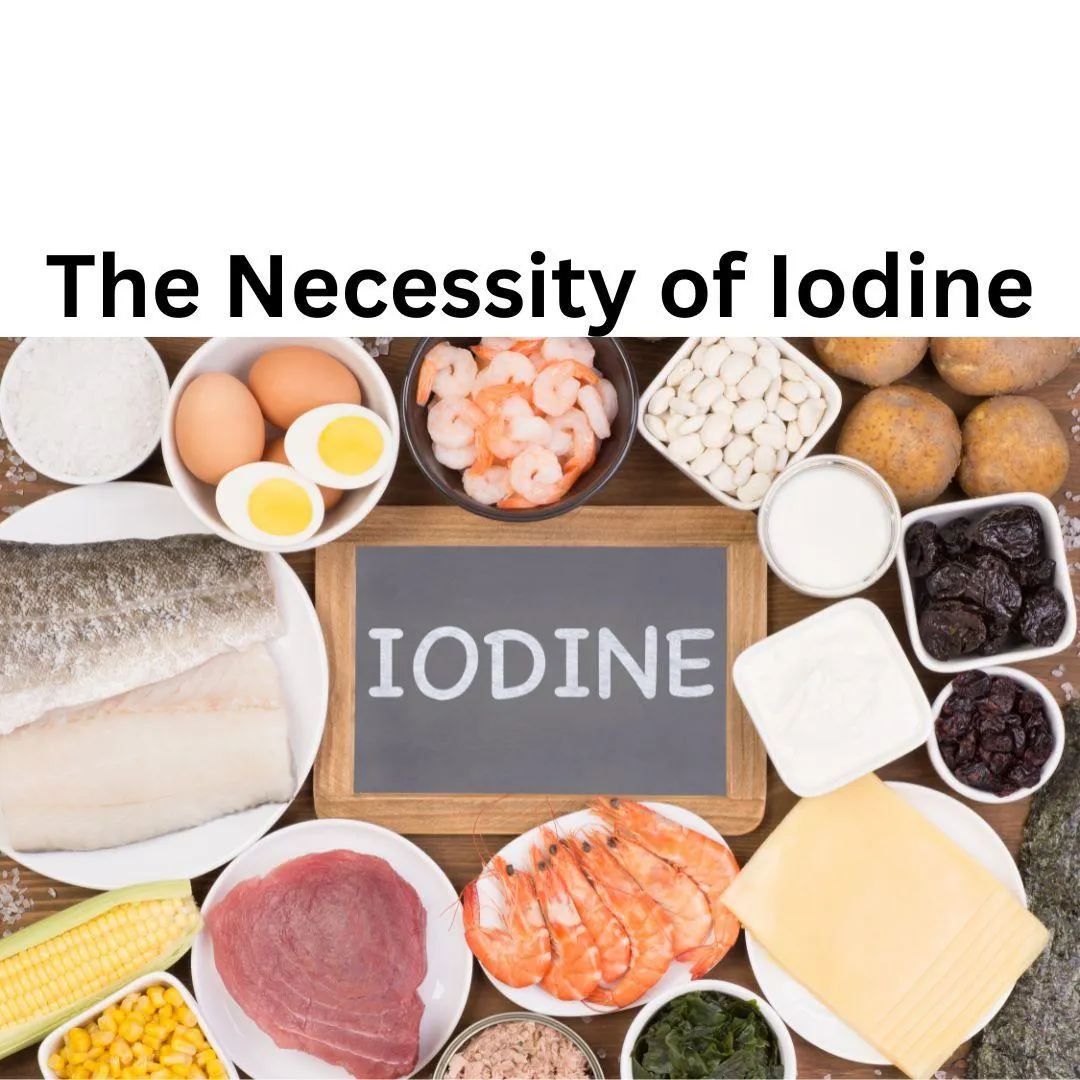*Open to Florida Residents
Blog
Blog

The Necessity of Iodine for Optimal Health
Iodine, a trace element essential for human health, plays a crucial role in various physiological functions. Despite being required in minute amounts, its impact on overall well-being is immense. This blog explores why iodine is indispensable for health, focusing on its role in hormonal regulation and cardiovascular function.
Iodine and Hormonal Health
One of iodine's most critical roles is int he production of thyroid hormones thyroxine (T4) and triiodothyronine (T3) the thyroid gland relies on iodine to synthesize these hormones, which regulate metabolism, energy production, and growth. Without sufficient iodine, the thyroid cannot produce adequate hormones, leading to conditions such as hypothyroidism and goiter.
The production of T4 and T3 begins with the absorption of iodine by the thyroid gland, where it is incorporated into the amino acid tyrosine. Enzymatic reactions convert this combination into the active hormones. T3, the more potent form, directly interacts with cellular receptors to regulate gene expression and metabolic processes. Iodine deficiency disrupts this process, causing hormonal imbalances of thyroid function. For instance:
Beyond T4 and T3, iodine indirectly influences other hormones through its regulation of thyroid function. For instance:
Insulin: Thyroid hormones affect glucose metabolism, which can impact insulin production and sensitivity.
Sex hormones: Estrogen and testosterone levels can be influenced by thyroid function, affecting reproductive health.
Cortisol: Thyroid hormones interact with adrenal function, modulating cortisol levels and stress response.
Thyroid hormones also play a vital role in the development and function of the pituitary gland, which regulates the release of other key hormones in the body.
Iodine’s Role in Cardiovascular Health
Iodine contributes to cardiovascular health through its regulation of thyroid hormones, which directly affect heart function. These hormones help maintain a normal heart rate, blood pressure, and cholesterol levels. When iodine intake is insufficient, the resulting hormonal imbalances can lead to arrhythmias, hypertension, and elevated cholesterol levels.
Moreover, iodine possesses antioxidant properties that help reduce oxidative stress, a factor contributing to cardiovascular disease. Adequate iodine intake supports endothelial function, promoting better blood vessel health and reducing the risk of atherosclerosis.
Dietary Sources of Iodine
To maintain optimal iodine levels, incorporating iodine-rich foods into your diet is essential. These include:
Seaweed: One of the richest natural sources of iodine.
Fish and Shellfish: Cod, tuna, and shrimp are excellent sources.
Dairy Products: Mild, yogurt, and cheese contain varying amounts of iodine.
Iodized Salt: A widely available and reliable source of dietary iodine.
Risk of Iodine Deficiency
Iodine deficiency remains a global health concern, particularly in regions where iodine rich foods are scarce. Symptoms of deficiency include fatigue, weight gain, hair loss, and cognitive impairments. Severe deficiency can lead to cretinism, a condition characterized by stunted physical and mental growth.
In recent years, the increasing popularity of specialty salts like Himalayan salt and sea salt has raised concerns about iodine deficiency. Unlike iodized table salt, these specialty salts often lack added iodine, which can contribute to insufficient dietary intake. While these salts may offer trace minerals and aesthetic appeal, they do not provide a reliable source of iodine. As individuals switch to these alternatives without supplementing iodine from other sources, the risk of iodine deficiency grows.
The implications of this shift are significant. For instance, reduced iodine intake can exacerbate existing thyroid conditions or lead to the development of new ones, such as goiter or hypothyroidism. Public health initiatives promoting iodized salt have been successful in combating iodine deficiency globally, but the trend toward non-iodized specialty salts threatens to reverse these gains. Consumers should be mindful of their iodine intake and consider fortified foods or supplements if specialty salts dominate their diet.
Conversely, excessive iodine intake can also be harmful, leading to thyroid dysfunction. Therefore, achieving a balanced iodine intake is crucial.
In summary, iodine is a vital nutrient that supports thyroid function, hormonal balance, and cardiovascular health. Ensuring adequate iodine intake through a balanced diet or supplementation, when necessary, is essential for maintaining optimal health. By prioritizing iodine, individuals can safeguard their metabolic, cardiovascular, and overall well-being.
Disclaimer:
This content is for informational and educational purposes only. It is not intended to provide medical advice or to take the place of medical advice or treatment from a personal health care professional. All viewers of this content are advised to consult their own qualified health professionals regarding specific health questions. Neither Vivien Murphy, or Elite Sexual Hormone Health takes responsibility for possible health consequences of any person or persons reading or following the information in this education’s content. All viewers of this content, especially those taking prescription or over the counter medications should consult their medical providers before beginning any nutrition, supplement or lifestyle program.

The Necessity of Iodine for Optimal Health
Iodine, a trace element essential for human health, plays a crucial role in various physiological functions. Despite being required in minute amounts, its impact on overall well-being is immense. This blog explores why iodine is indispensable for health, focusing on its role in hormonal regulation and cardiovascular function.
Iodine and Hormonal Health
One of iodine's most critical roles is int he production of thyroid hormones thyroxine (T4) and triiodothyronine (T3) the thyroid gland relies on iodine to synthesize these hormones, which regulate metabolism, energy production, and growth. Without sufficient iodine, the thyroid cannot produce adequate hormones, leading to conditions such as hypothyroidism and goiter.
The production of T4 and T3 begins with the absorption of iodine by the thyroid gland, where it is incorporated into the amino acid tyrosine. Enzymatic reactions convert this combination into the active hormones. T3, the more potent form, directly interacts with cellular receptors to regulate gene expression and metabolic processes. Iodine deficiency disrupts this process, causing hormonal imbalances of thyroid function. For instance:
Beyond T4 and T3, iodine indirectly influences other hormones through its regulation of thyroid function. For instance:
Insulin: Thyroid hormones affect glucose metabolism, which can impact insulin production and sensitivity.
Sex hormones: Estrogen and testosterone levels can be influenced by thyroid function, affecting reproductive health.
Cortisol: Thyroid hormones interact with adrenal function, modulating cortisol levels and stress response.
Thyroid hormones also play a vital role in the development and function of the pituitary gland, which regulates the release of other key hormones in the body.
Iodine’s Role in Cardiovascular Health
Iodine contributes to cardiovascular health through its regulation of thyroid hormones, which directly affect heart function. These hormones help maintain a normal heart rate, blood pressure, and cholesterol levels. When iodine intake is insufficient, the resulting hormonal imbalances can lead to arrhythmias, hypertension, and elevated cholesterol levels.
Moreover, iodine possesses antioxidant properties that help reduce oxidative stress, a factor contributing to cardiovascular disease. Adequate iodine intake supports endothelial function, promoting better blood vessel health and reducing the risk of atherosclerosis.
Dietary Sources of Iodine
To maintain optimal iodine levels, incorporating iodine-rich foods into your diet is essential. These include:
Seaweed: One of the richest natural sources of iodine.
Fish and Shellfish: Cod, tuna, and shrimp are excellent sources.
Dairy Products: Mild, yogurt, and cheese contain varying amounts of iodine.
Iodized Salt: A widely available and reliable source of dietary iodine.
Risk of Iodine Deficiency
Iodine deficiency remains a global health concern, particularly in regions where iodine rich foods are scarce. Symptoms of deficiency include fatigue, weight gain, hair loss, and cognitive impairments. Severe deficiency can lead to cretinism, a condition characterized by stunted physical and mental growth.
In recent years, the increasing popularity of specialty salts like Himalayan salt and sea salt has raised concerns about iodine deficiency. Unlike iodized table salt, these specialty salts often lack added iodine, which can contribute to insufficient dietary intake. While these salts may offer trace minerals and aesthetic appeal, they do not provide a reliable source of iodine. As individuals switch to these alternatives without supplementing iodine from other sources, the risk of iodine deficiency grows.
The implications of this shift are significant. For instance, reduced iodine intake can exacerbate existing thyroid conditions or lead to the development of new ones, such as goiter or hypothyroidism. Public health initiatives promoting iodized salt have been successful in combating iodine deficiency globally, but the trend toward non-iodized specialty salts threatens to reverse these gains. Consumers should be mindful of their iodine intake and consider fortified foods or supplements if specialty salts dominate their diet.
Conversely, excessive iodine intake can also be harmful, leading to thyroid dysfunction. Therefore, achieving a balanced iodine intake is crucial.
In summary, iodine is a vital nutrient that supports thyroid function, hormonal balance, and cardiovascular health. Ensuring adequate iodine intake through a balanced diet or supplementation, when necessary, is essential for maintaining optimal health. By prioritizing iodine, individuals can safeguard their metabolic, cardiovascular, and overall well-being.
Disclaimer:
This content is for informational and educational purposes only. It is not intended to provide medical advice or to take the place of medical advice or treatment from a personal health care professional. All viewers of this content are advised to consult their own qualified health professionals regarding specific health questions. Neither Vivien Murphy, or Elite Sexual Hormone Health takes responsibility for possible health consequences of any person or persons reading or following the information in this education’s content. All viewers of this content, especially those taking prescription or over the counter medications should consult their medical providers before beginning any nutrition, supplement or lifestyle program.
Let me help you achieve your goals.
Disclaimer: We understand that every individual's experience is unique and results may vary depending on various factors, such as attitude, adaptability, personal history, and overall health. For your safety and well-being, we highly recommend consulting your physician before beginning any program. At Elite Sexual Hormone Health, we do not diagnose, treat, or prescribe any medical or psychological disorders. We urge you to seek the care of a qualified physician or psychotherapist if you suffer from any psychological or medical disorder. Thank you for choosing Elite Sexual Hormone Health as your partner in your journey towards wellness.
© 2025, Elite Sexual Hormone Health. All rights reserved.
Privacy Policy | Terms of Service | Disclaimer
© 2025, Elite Sexual Hormone Health. All rights reserved.
Website by Hypnotherapy Accelerator





